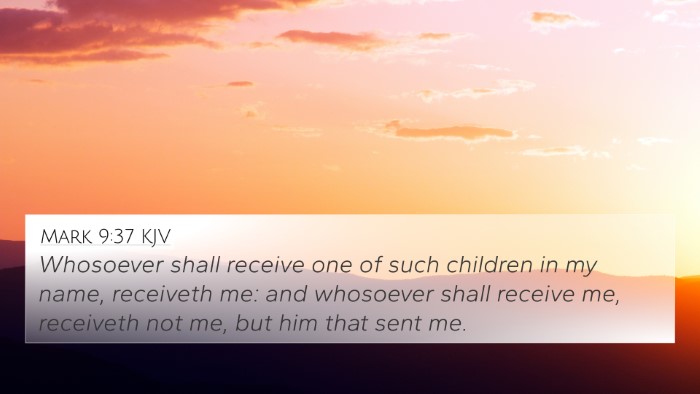This section features a detailed cross-reference designed to enrich your understanding of the Scriptures.
Below, you will find carefully selected verses that echo the themes and teachings related to Luke 10:16 KJV. Click on any image to explore detailed analyses of related Bible verses and uncover deeper theological insights.
 John 13:20 (KJV) »
John 13:20 (KJV) »
Verily, verily, I say unto you, He that receiveth whomsoever I send receiveth me; and he that receiveth me receiveth him that sent me.
 Matthew 10:40 (KJV) »
Matthew 10:40 (KJV) »
He that receiveth you receiveth me, and he that receiveth me receiveth him that sent me.
 John 12:44 (KJV) »
John 12:44 (KJV) »
Jesus cried and said, He that believeth on me, believeth not on me, but on him that sent me.
 John 5:22 (KJV) »
John 5:22 (KJV) »
For the Father judgeth no man, but hath committed all judgment unto the Son:
 John 12:48 (KJV) »
John 12:48 (KJV) »
He that rejecteth me, and receiveth not my words, hath one that judgeth him: the word that I have spoken, the same shall judge him in the last day.
 Mark 9:37 (KJV) »
Mark 9:37 (KJV) »
Whosoever shall receive one of such children in my name, receiveth me: and whosoever shall receive me, receiveth not me, but him that sent me.
 Malachi 1:6 (KJV) »
Malachi 1:6 (KJV) »
A son honoureth his father, and a servant his master: if then I be a father, where is mine honour? and if I be a master, where is my fear? saith the LORD of hosts unto you, O priests, that despise my name. And ye say, Wherein have we despised thy name?
 Luke 9:48 (KJV) »
Luke 9:48 (KJV) »
And said unto them, Whosoever shall receive this child in my name receiveth me: and whosoever shall receive me receiveth him that sent me: for he that is least among you all, the same shall be great.
 Numbers 16:11 (KJV) »
Numbers 16:11 (KJV) »
For which cause both thou and all thy company are gathered together against the LORD: and what is Aaron, that ye murmur against him?
 Acts 5:4 (KJV) »
Acts 5:4 (KJV) »
Whiles it remained, was it not thine own? and after it was sold, was it not in thine own power? why hast thou conceived this thing in thine heart? thou hast not lied unto men, but unto God.
 Numbers 14:2 (KJV) »
Numbers 14:2 (KJV) »
And all the children of Israel murmured against Moses and against Aaron: and the whole congregation said unto them, Would God that we had died in the land of Egypt! or would God we had died in this wilderness!
 Numbers 14:11 (KJV) »
Numbers 14:11 (KJV) »
And the LORD said unto Moses, How long will this people provoke me? and how long will it be ere they believe me, for all the signs which I have showed among them?
 Exodus 16:7 (KJV) »
Exodus 16:7 (KJV) »
And in the morning, then ye shall see the glory of the LORD; for that he heareth your murmurings against the LORD: and what are we, that ye murmur against us?

















